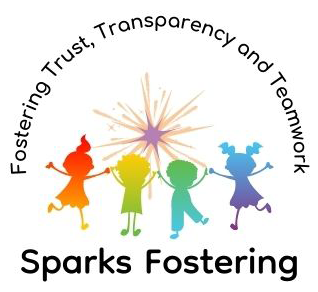As an experienced fostering social worker, I sometimes find it awkward and uncomfortable to tell foster carers (or others) that I have to limit the time I can spend talking with them – it has the risk of creating a distance and formality in our relationship that can sometimes feel unkind. But I do enforce boundaries, because having boundaries is necessary for my personal and professional wellbeing.
In some social work jobs, the time pressures are unreasonable and dangerous; for example, I left child protection social work after about 9 months because I was given a caseload of 46 children, which wasn’t manageable and not safe for the children, or for me. Child protection social workers have to be very controlled about the time that they give to each child and family, otherwise they would be neglecting the other children they are supposed to be supporting. That said, very high caseloads (like I had) are impossible to manage responsibly, even if the social worker is working long hours. Sadly, child protection social workers are often expected to work very long hours, with no extra pay or leave and little regard for their own children who spend limited time with a parent who is stressed.
My situation is different now, as the registered manager (and owner) of a fostering agency, I control my workload. The social workers and support workers in the agency also manage their own workloads, so they can decide how much work to take on. But still, despite the additional control, I continue to have clear boundaries with foster carers (and staff). Good social workers want to help people, and we are taught about relationship-based social work, the importance of building trust and how we should be active listeners for the people that we are supporting; but there’s little focus on maintaining boundaries – which is key to making sure that we can maintain a good work/life balance, that we have time for all of the people we are supporting, and so we can maintain professional distance in our relationships and ‘respectful uncertainty’.
One of the greatest challenges for social workers is to continue to be critical of people who they have come to like – this is especially the case in foster care, where social workers want to believe that applicants and foster carers are wonderful people who will offer excellent care to vulnerable children. It is natural for social workers to want to believe foster carers when they present themselves in the best possible light; however, to be frank, some applicants and foster carers lie, and they should not be caring for children. It’s impossible for social workers to know every time that they are lied to, so social workers must continue to question the information provided to them, no matter how much they have an affinity for the foster carers. Good social workers aren’t ‘friends’ of people who they support; indeed, if a social worker starts sharing personal information, or meeting the foster socially, this would be a conflict of interest and has to be declared to line managers immediately, so that another social worker can be allocated. Failure to do so could result in disciplinary action.
As the line manager of social workers, I have found that the assessments of social workers who ‘befriend’ or clearly hold high regard for foster carers (without sufficient critique) are usually of the lowest quality (and need to be rewritten) – it’s in the best interest of fostering applicants/carers that their social worker remains critical of all information that is passed to them (until the information is verified). The best and most robust social work assessments have strong evidence that the social worker was comprehensive in trying to find any gaps in the fostering assessment and in trying to evidence all information presented to them.
We don’t want foster carers (or other people we support) to feel judged, misunderstood, unsupported or undervalued, so I have put together the following advice, which can be shared with the people we help, so that they can be clear about the type and level of support that their social worker will offer.

Understand the expertise of the social worker
The social worker must be clear about the social worker’s roles and where our expertise ends; for example, if a fostering applicant starts becoming very upset while exploring unresolved trauma, the social worker should consider asking them complete some counselling sessions (with a professional counsellor) then reapply for fostering (so that they aren’t at risk of secondary trauma when caring for children in a fostering placement). Social workers aren’t counsellors or therapists; social workers must be able to obtain enough information to make an assessment of emotional and mental wellbeing (sometimes we have to consult with therapists to make that assessment), we are not the right people to counsel others through recovery from complex trauma.
Foster carers also need clarity about what aspects of the work are there responsibility. I have previously taken over supervision for a foster carer whose social worker wrote their recordings for them even though the foster carer had good literacy skills. Not only does this deskill the foster carer, but it makes a rod for the backs of any other social workers who go on to work with the foster carer. Sparks Fostering does not approve foster carers who aren’t able to complete their own paperwork or who don’t have reasonable IT skills – partly because we are a paper-free organisation, but also because foster carers must be accountable for the information they provide, which is realistically only possible if they write their recordings themselves. Social workers must be clear about their organisational expectations when offering support.

Structure the sessions
One of the nicest parts of social work is that we have lovely chats with others, especially in the fostering sector, where we can build up pleasant and positive relationships with applicants and foster carers. However, without structure these chats end up being counterproductive. I’ve line managed social workers who will sit with applicants for four hours, make only a few notes, and then forget half the things that have been said to them – so they have to ask applicants to repeat the information in subsequent assessment sessions. This is not acceptable or fair to applicants and invariably results in a poor quality assessment.
Every session, even phone calls, should be structured in the following way:
- Agreement of what is to be discussed (an agenda)
- Agreement of how much time is available for the session
- Discussion of each point (what happened)
- Discussion of why the information is important, including consideration of risk when appropriate (analysis of the information)
- Agreement about any follow-up actions, including who will do them and by when
- Social worker to summarise the information and confirm outcomes
The social worker should take notes about the session as it is happening (ideally directly onto the database, but if this isn’t possible, onto paper). Foster carers (and others) should give the social worker time to take notes during the discussions.
If the discussions aren’t completed in the agreed time, another time and date should be agreed to continue the discussions. Alternatively, there can be an agreement to wait for certain actions to be completed before another session is booked. Some information can be shared via text messages, and these messages must also be recorded by the social worker. Emails are preferable to text message because they can be copy/pasted onto the Sparks Fostering software. Foster carers and staff should be careful to conclude discussions within the time allocated.
By default, foster carers and social workers should aim to respond to communication (whether text, missed phone calls or emails) within one working day, but this can be slightly delayed if the enquiry isn’t urgent. Social care services have duty numbers that can be contacted straight away in an emergency.
When a large piece of work is to be completed, a rough estimate of timescales should be agreed – and timescales should be confirmed in writing and added to the staff and foster carer calendars.

Consider communication styles
Social workers and foster carers should be mindful of different thinking and communication styles; for example, some people have to talk through their thought process, especially for complex issues – so social workers may need to give them time to talk before moving ahead with the discussion. Other people need time and silence to think through complex issues – so social workers may need to pause conversations and resume after an agreed amount of time. Social workers and foster carers should learn their own and other people’s needs so that they can communicate effectively.
Also, different people have different learning styles (visual, auditory, reading/writing, and kinaesthetic); foster carers and social workers need to be able to process information that is read/written and spoken in order to carry out the professional aspects of the work.
Foster carers and social workers should reflect on their own learning and communication styles; then they should communicate that with people who they work with regularly and also try to adapt according to the needs of the situation.

Consider feelings and emotions
Social workers should never expect foster carers to support them with their own emotional stress – this should be addressed in social work supervision.
Social workers should aim to be attuned to the emotional and mental state of foster carers and should offer support accordingly. If the social worker can provide appropriate and satisfactory support in a reasonable amount of time, this can be offered. Sometimes social workers may need to advise foster carers to use other coping strategies, such as speaking with the backup carer, writing a journal, or whatever the foster carer finds useful.
Social workers and foster carers must approach every interaction with patience, compassion and kindness. This doesn’t mean that disagreements or criticism must be avoided; only that they must happen with a focus on trying to achieve best outcomes for the children in our care and with respect for each other as human beings who are doing the best that we can.

Share paperwork
Foster carers (and children) have a right to access the information that is held about them on the Sparks Fostering database. When foster carers are unsure about decisions being made by the agency, foster carers may find it useful to review the assessments that have been written about them. This can also be an opportunity for foster carers to correct any misunderstandings, or gain a greater understanding about the decision making progress of the agency.
Read and learn the agency policies, procedures and guidance
Sparks Fostering provides comprehensive guidance about how foster carers and social workers are expected to carry out their work. All foster carers and social workers are expected to know the guidance well. This reduces the amount of time spent discussing what the agency expectations and requirements are, and frees up time to offer more specialist support.

Follow the complaints procedure
Foster carers who are unhappy with the support being provided are encouraged to follow the complaints procedure. Complaints are not considered to be combative; rather, complaints are an opportunity for disagreements to be resolved and for the agency to improve.
In summary, a core aspect of professional social work practice is to maintain boundaries and structure in our work. It requires diplomacy and skill to clarify boundaries with others without offending them or causing hurt or offence; however, social workers who are able to maintain professional boundaries are best placed to safeguard children and complete their work to a good standard.
To find out more about foster care, see www.SparksFostering.org









